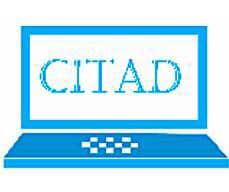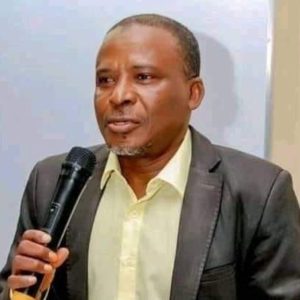CITAD, Actionaid Nigeria Mark Children’s Day Celebration With Less Privileged Children
May 28, 2021
As Nigeria marks this year’s International Children’s Day celebration, the Center for Information Technology and Development (CITAD), has marked the occasion with less privileged children in neglected communities in Abuja, the capital of Nigeria.
Left(from behind) CITAD FCT State Coordinator for Youth Digital Engagement, Mubarak Ekute and CITAD Programme Officer, Yesmin Salako(far right) in group photograph with some of the children who celebrated the International Children’s Day in Gofidna community in Abuja on Thursday.
The International Children’s Day, which was commemorated on Thursday nationwide, was celebrated with support from Actionaid Nigeria in Gofidna, Gwalada and Dakwa communities all in Abuja Municipal Area Council(AMAC) of the FCT under the Local Rights Programme of the organization.
Highlight of the event was an interactive session with children in the communities during the event. The children spoke about their dreams and aspiration for the future after which they were educated on the importance of education for a bright future.
Speaking during the session, CITAD Programme Officer, Yesmin Salako advised the school children to take their studies very seriously because it is pathway for greatness.
“You must focus on your education and read hard because you are the future leaders of tomorrow,” she advised.
CITAD FCT State Coordinator for Youth Digital Engagement, Mubarak Ekute during the interactive session with the children who celebrated the International Children’s Day in Gofidna community in Abuja on Thursday.
In an interview with journalists, Salako frowned against gender discrimination against the girl child who in some cases are denied their rights to education.
She urged parents to ensure both male and female children are given equal access to education.
“Students should face their studies because education is key to a successful future.
Parents also should ensure both their male and female children have equal access to education. They should not discriminate between the girlchild and the boy child because they are all the same. They should all be given equal rights and children’s rights should not be violated,” she said.
The programme officer said every child deserved to live a happy life and be merry and have a sense of belonging especially at such an occasion.
According to her, Actionaid Nigeria and CITAD considered the neglected communities the right place to mark the Children’s Day celebration to give the less privileged children a sense of belonging.
CITAD Programme Officer, Yesmin Salako addressing the children in Gofidna community during an the event to mark the 2021 International Children Day Celebration on Thursday in Abuja.
“We are a non governmental and development organization that work to better the lives of people who have been deprived. So our coming into this community is to celebrate with children who don’t feel the joy of the Day because their parents are poor can not afford to celebrate with them like their counterparts in the city who are being taken out by their parents for shopping, to eateries and to have fun at amusement parks. We have come here to fill in the vacuum, to celebrate with them and make them feel loved and happy, ” she stated.
Salako said CITAD and Actionaid Nigeria have intervened in several ways to ensure the communities fight for their rights and ensured government construct schools in their communities like in Tungan Ashere, where a block of classrooms have been constructed for the community.
She pledged that CITAD will continue to do its best to ensure that the rights of children are protected and they are also given the best so that they can have a good future.
On his part, CITAD FCT State Coordinator for Youth Digital Engagement , Mubarak Ekute noted that while the children of the rich and those of average status have access to abundant resources and development, children in these communities are less privileged.
“They don’t have this kind of opportunity. They are left behind. In a day like this, they will feel lonely, left out and neglected so for us, this is the right place to mark the celebration,” he said.
Advising the children on the need to go to school, he emphasized that they must work hard in school to become great in future.
“Make sure at all times that school is the number one priority. If you don’t go to school, you will be the least in the society and not be relevant. It is very important to go to school and learn. You must also respect your parents and elders,” he advised the children.
He also advised the children to always remember to wash their hands regularly with soap as part of the measured to cut down the risk of Covid-19 infection and other diseases.
Also in a separate interview with journalists after the event, Ekute said the organizations have contributed in so many ways to the education of children in the neglected communities especially in the areas of ICT.
“We have deployed ICT centres in some of these communities and people from the neighboring communities are also coming to acquire computer skills.
The world has now become a global village. With ICT you can bring education closer to the people since they don’t have access to some of those materials.”
Speaking on the theme of this year’s celebration tagged: “Unite to Reverse the Impact of Covid-19 Pandemic on Children,” he said the COVID-19 pandemic has exposed the poor state of the educational institution, health sectors, insecurity, and other sectors of life, which has a lots of negative impacts on our children.”
He harped on the need to step up efforts towards the development of the country’s health and education system for better learning and greater future for the country.
“A better system full of opportunities will lead to a better future for our children and by extension the future of the nation at large. COVID 19 has taught us a better lesson that education cannot be only achieved in the classroom alone.
“Investment in technology is also investing in the future of the country. As we celebrate our children today, we must recommit and redouble our efforts and come up with the best framework that will suit the development of our children and also fast-track learning and our health system to build back a better Nigeria,” he said.
Ekute appealed to the general public and government to ensure that all children have a better life.
It was the most happiest moment for the children as they were served light refreshments which ushered them into the celebration proper as they dined and wined with representatives of the organizations and the communities.
Zainab Ismail, 10-year-old, says she felt very happy that people from the city came to celebrate the event with them.
The Basic 5 pupil of the LEA Primary School, Gofidna, who hopes to become a doctor in future said she will work harder to achieve her dreams.
Another child, Abdullahi Musliu, 12 , said she felt delighted that they were given the opportunity to join the rest of the children across the country to celebrate the International Children’s Day.
“I am very happy and so joyful and I thank Actionaid and CITAD for remembering us in this community,” the JSS 1 student aspiring to be a teacher said.
Representatives of the communities who were present at the occasion thanked Actionaid Nigeria and CITAD for bringing the celebration to their community.
“We sincerely appreciate and thank Actionaid Nigeria and CITAD for always working to protect our interest in this community. Without them, we will not be where we are today. We are happy and grateful that this event is happening in our community. On behalf of the children, we say we are happy and glad to mark this important day with the rest of the country,” one of the community Champions in Gofidna community, Al Mustapha Tekura told journalists.







